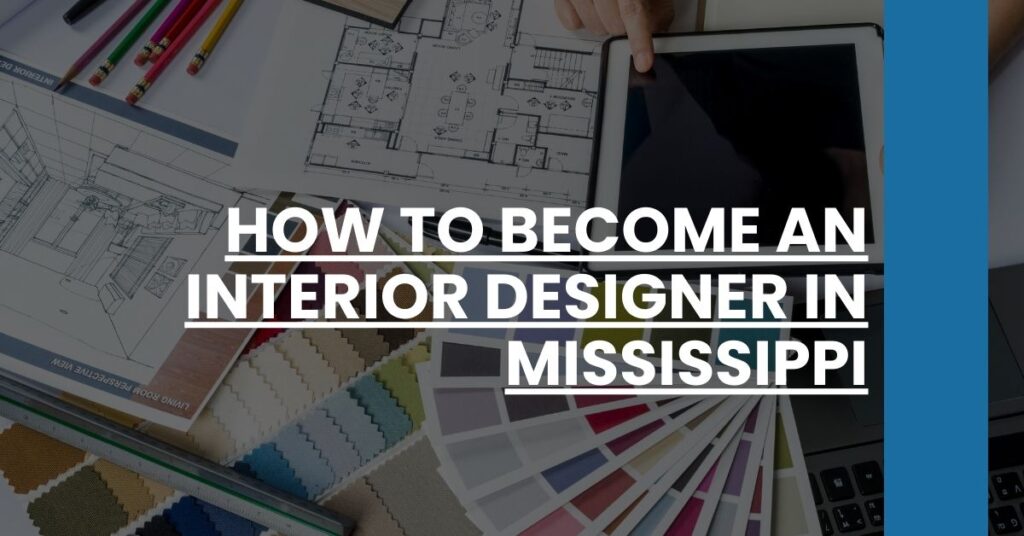Embarking on the path of how to become an interior designer in Mississippi? Here are the steps you need to follow to make your dream a reality.
- Understand the role of an interior designer: Learn about the diverse responsibilities and essential skills.
- Meet educational requirements: Pursue relevant coursework and degrees to build a strong foundation.
- Gain hands-on experience: Participate in internships and apprenticeships to enhance your practical skills.
With dedication and the right steps, your career as an interior designer in Mississippi awaits.
- Understand the Role of an Interior Designer
- Educational Requirements for Interior Designers in Mississippi
- Certification and Licensing Requirements
- Gaining Practical Experience
- Building a Portfolio
- Networking and Professional Associations
- Continuing Education and Specializations
- Job Opportunities and Career Growth
- Looking for Interior Designer Information On States Bordering Mississippi?
- Conclusion
Understand the Role of an Interior Designer
An interior designer in Mississippi blends creativity with technical knowledge to enhance the functionality and aesthetics of spaces. From residential homes to commercial arenas, their work impacts different environments.
Key Responsibilities
- Space Planning: This involves arranging furniture and other design elements within a room to achieve optimal functionality and visual appeal. Good spatial awareness is crucial.
- Client Consultation: Understanding clients’ needs and tastes is essential. You must be able to communicate effectively and present design ideas convincingly.
- Material Selection: Choosing the right materials for flooring, fabrics, and finishes to strike a balance between durability and aesthetics.
- Project Management: Overseeing the implementation of the design project, coordinating with contractors, and ensuring projects remain on budget and meet deadlines.
- Staying Current: Keeping up with trends, building codes, and regulations affecting design.
Essential Skills for Success
- Creativity: You need a unique vision to create visually stunning and functionally efficient designs.
- Technical Proficiency: Knowledge of design software like AutoCAD or SketchUp is a must.
- Problem-Solving: Unexpected issues often arise during projects, and quick, effective solutions are essential.
- Time Management: Balancing multiple projects requires exceptional organizational skills.
- Communication: Both written and verbal communication skills are crucial for presenting ideas and collaborating with clients and other professionals.
Educational Requirements for Interior Designers in Mississippi
High School Preparation
Start with related coursework in high school to plant the seeds for a career in interior design.
- Focus on Art and Design: Classes like drawing, painting, and graphic design can hone your aesthetic skills.
- Computer-Aided Design (CAD): Schools often offer introductory courses in CAD software, which is integral in modern interior design.
Pursuing a Bachelor’s Degree
In Mississippi, a bachelor’s degree in interior design is vital.
- Accredited Programs: Institutions like Mississippi State University offer rigorous programs covering core design principles, sustainability, and practical applications.
- Comprehensive Curriculum: Expect coursework in design theory, color theory, space planning, and CAD. The inclusion of sustainability and universal design ensures a well-rounded education.
- Internships: Most programs integrate internships, allowing students to gain hands-on experience and apply their classroom knowledge in real-world settings.
Education That Sets You Apart
Choose programs that not only teach design but also offer practical experience. This blend will equip you with both theoretical knowledge and practical skills.
Certification and Licensing Requirements
NCIDQ Certification
The NCIDQ (National Council for Interior Design Qualification) exam is the gold standard.
- Exam Structure: The NCIDQ exam comprises three parts: the Interior Design Fundamentals Exam (IDFX), the Interior Design Professional Exam (IDPX), and the Practicum Exam (PRAC).
- Covered Topics: The exams test knowledge in building systems, construction standards, and design application.
- Benefits of Certification: Holding an NCIDQ certification enhances your professional credibility and job prospects, even though it is not a licensing requirement in Mississippi.
Importance of Certification
Achieving the NCIDQ certification demonstrates your commitment to quality and professional development, making you more attractive to potential employers.
Gaining Practical Experience
Internships During College
Participating in internships is vital.
- Real-World Application: These opportunities allow you to apply theoretical concepts to actual projects.
- Building Connections: Internships help you establish professional relationships that can be invaluable in your career.
Entry-Level Positions
Upon graduation, seek out entry-level roles to continue learning and growing.
- Junior Designer Roles: These positions enable you to assist experienced designers, gradually learning more complex tasks.
- Learning from Experience: You can gain practical experience in project management, client interaction, and problem-solving.
Mentorship Opportunities
Finding a mentor can be incredibly beneficial.
- Guidance and Advice: A mentor can provide personalized career advice and feedback on your work.
- Professional Network: Networking with seasoned professionals expands your professional network, leading to more job opportunities.
By systematically building your skills and experience, you position yourself to become a successful interior designer in Mississippi.
Building a Portfolio
Creating a strong portfolio is essential for showcasing your interior design projects and skills. Your portfolio acts as a visual resume, demonstrating your capabilities to potential clients and employers.
Showcase Varied Work
You should include a variety of projects to highlight your versatility:
- Residential Projects: Display your ability to transform living spaces into functional and aesthetically pleasing environments.
- Commercial Projects: Show your competence in designing professional spaces such as offices, retail stores, or restaurants.
- Specialized Designs: Feature niche designs such as sustainable projects or custom furniture to stand out.
Besides, ensure the included projects reflect a range of styles and sizes to showcase your adaptability.
High-Quality Visuals
Visual appeal is crucial in your portfolio. High-quality images and detailed diagrams can make your work stand out:
- Professional Photography: Invest in professional photos of completed projects to ensure clarity and detail.
- Clear Diagrams: Use diagrams to explain complex aspects of your designs.
This approach makes it easier for the viewer to understand your work.
Narrative Descriptions
Each project should include a narrative that explains:
- Design Challenges: Describe the challenges faced and how you overcame them.
- Solutions Provided: Highlight the functional and aesthetic solutions you implemented.
- Design Process: Outline your design process from concept to completion.
These narratives should provide context and demonstrate your problem-solving skills.
Digital Portfolios
Digital portfolios are increasingly popular and versatile:
- Accessibility: Easily shareable via email or social media.
- Interactive Elements: Incorporate videos, 360-degree views, or animations to engage viewers.
Use platforms like Behance, Adobe Portfolio, or create your own website to present your work professionally online.
Networking and Professional Associations
Connecting with others in the industry can significantly boost your career as an interior designer in Mississippi.
Join Professional Associations
Associations like the American Society of Interior Designers (ASID) offer numerous benefits:
- Networking Opportunities: Meet and connect with other professionals.
- Industry Events: Attend conferences, workshops, and seminars to stay updated on trends and technologies.
- Continuing Education: Access resources and courses to continually improve your skills.
Being an active member in such associations demonstrates your commitment to professional growth.
Attend Industry Conferences
Industry conferences are invaluable for:
- Learning from Experts: Gain insights from leading designers and industry experts.
- Showcasing Your Work: Participate in design competitions or exhibitions.
- Building Your Network: Meet potential clients, employers, and collaborators.
These events offer a platform to learn and grow within the industry.
Local Networking Opportunities
Engage with local chapters and groups:
- Local Meetups: Participate in meetups and local events to build connections within your community.
- Workshops: Attend or even host workshops to share knowledge and skills.
Local networking can lead to collaborations and new projects.
Professional Growth through Networking
Regular networking helps you:
- Build Your Reputation: Establish yourself as a knowledgeable and connected professional.
- Find Job Opportunities: Many job opportunities come through personal connections and referrals.
- Stay Informed: Keep up with the latest industry trends and best practices.
Active networking is integral to your career development and success in interior design.
Continuing Education and Specializations
Continuing education is vital for staying current and competitive in the ever-evolving field of interior design.
Stay Updated with Trends
Stay ahead by constantly learning about:
- Design Technologies: Keep up with advancements in CAD software and other design tools.
- Industry Regulations: Stay informed about changes in building codes and regulations.
- Emerging Design Trends: Understand trends in sustainability, biophilic design, and smart home technology.
Continuous learning demonstrates your commitment to excellence.
Specialized Courses and Workshops
Mississippi offers various advanced courses and workshops:
- Sustainable Design: Learn about eco-friendly materials and energy-efficient design practices.
- Kitchen and Bath Design: Specialize in high-demand areas of home renovation.
- Commercial Interiors: Focus on designing professional spaces with functional and aesthetic considerations.
Specializing can open new career opportunities and increase marketability.
Advantages of Specializing
Specializing in a niche area can:
- Boost Expertise: Deepen your knowledge and skills in a specific area of interest.
- Increase Demand: Specialized skills are often in higher demand.
- Enhance Marketability: Stand out in the job market or attract specific clientele.
Specializing makes you a go-to expert in particular fields of interior design.
Job Opportunities and Career Growth
The interior design industry in Mississippi offers a range of job opportunities and career paths.
Potential Employers
You can find opportunities in various settings:
- Design Firms: Work on diverse projects and collaborate with other designers.
- Architectural Offices: Integrate interior design with architectural projects.
- Construction Industry: Oversee the implementation of design solutions on-site.
Explore different environments to find the right fit for your career.
Career Pathways
Interior design offers various career stages:
- Junior Designer: Start by assisting senior designers and learning the ropes.
- Senior Designer: Take on leadership roles and manage client projects.
- Project Manager: Oversee entire projects from concept to completion.
Each step offers new challenges and learning experiences.
Financial Outlook
According to recent data, interior designers in Mississippi earn:
- Average Salary Range: $40,000 to $70,000 annually.
- Higher Potential: Specializing in areas such as sustainable design can lead to higher earnings.
Experience, specialization, and continued education can positively impact your earning potential.
Career Advancement
Career growth can lead to:
- Managerial Roles: Higher-level positions in design firms or architectural offices.
- Own Design Firm: Start your own firm for greater creative freedom and financial rewards.
Advancing in your career opens new opportunities for personal and professional fulfillment.
Looking for Interior Designer Information On States Bordering Mississippi?
In addition to Mississippi, we suggest looking for schools in nearby states.
- How to Become An Interior Designer in Louisiana
- How to Become An Interior Designer in Arkansas
- How to Become An Interior Designer in Tennessee
- How to Become An Interior Designer in Alabama
- How to Become An Interior Designer in Florida
Conclusion
The journey to becoming an interior designer in Mississippi involves targeted education, practical experience, and continuous professional development. By building a robust portfolio and networking effectively, you can carve out a successful career in interior design. Stay dedicated to your craft, and the opportunities will follow.

